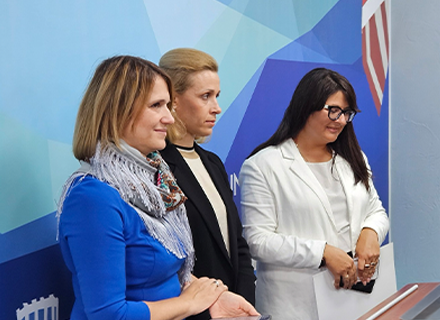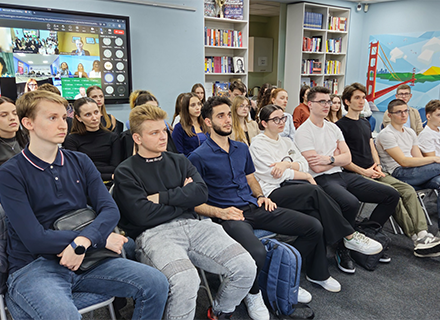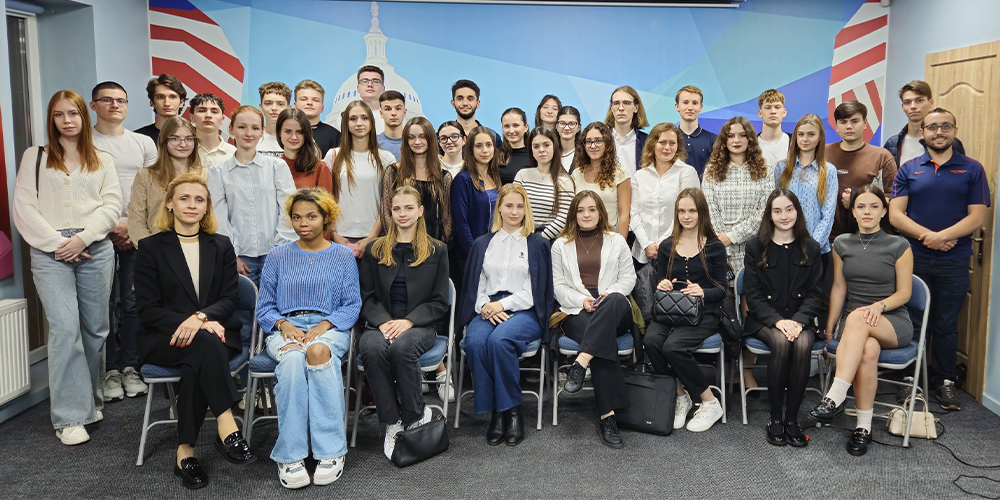
Bringing together six campuses and five cities on two continents, the USF St. Petersburg Center for Civic Engagement recently hosted a Constitution Day Discussion with faculty and students in Moldova to discuss the elections in both countries this year.
The conversation at hand: the United States was holding its presidential election on Nov. 5 and the Republic of Moldova had its scheduled for Oct. 20. Held weeks before American voters returned Donald Trump back to the Oval Office and Moldova re-elected its incumbent president Maia Sandu to a final term, the conversation focused on the aspects of democracy shared by two very different nations at their own unique crossroads.
As a landlocked country in Eastern Europe, bordering Ukraine and Romania, Moldova’s voting has traditionally been driven by contradictions and their elections can be as contentious as American ones. In the most recent election, the two candidates represented a choice between the West and Russia — Sandu representing the pro-European interests and her opponent, former Prosecutor General Alexandr Stoianoglo, favoring Russia-oriented policies. During the first round of elections, a national constitutional referendum was held to determine if Moldovan citizens wished to join the European Union — a majority of Moldovans voted “yes.”
As a landlocked country in Eastern Europe, bordering Ukraine and Romania, Moldova’s voting has traditionally been driven by contradictions and their elections can be as contentious as American ones.
The Constitution Day Discussion allowed both USF students and students from Moldova to understand the importance of elections, the differences and similarities in their constitutions and election practices, as well as offered a comparative view of two different countries’ experiences with democracy. Students were able to compare contrasting provisions of the U.S. Constitution and the Moldovan Constitution, and what they say about presidential elections.
“It really helps students to think more critically and more deeply about the topics,” said USF Associate Professor of Political Science Judithanne Scourfield McLauchlan, the founding director for the Center for Civic Engagement. “This event was really an extraordinary cooperation that continues to be relevant.”
The engagement with Moldova started almost 15 years ago with McLauchlan. Her work focuses on the establishment of constitutional democracies and the efforts towards democratization and strengthening rule of law after the fall of the Soviet Union. In 2010, McLauchlan was a Fulbright Scholar in Moldova at the Free University of Moldova (ULIM) starting a longstanding partnership that continues to this day.
In addition to her work as a scholar, McLauchlan has extensive experience in American
government and politics, having worked at the U.S. Supreme Court, the U.S. Senate
Judiciary Committee, the U.S. Department of Justice, and the White House during both
terms of President Bill Clinton. She has also completed another Fulbright, working
in Skopje and Tetovo, Macedonia.
Last year was the first year of the Constitution Day Discussions. “I was in Moldova
teaching constitutional law and I had this idea,” McLauchlan said. “Wouldn’t it be
great to get my students talking to my students in Florida?
“It was just amazing,” she said. “Last year’s round was such a success, I was like, we need to do this again.”

This year, the Center for Civic Engagement collaborated with Casey Welch, the Assistant Vice President for External Affairs and Government Relations at USF Sarasota-Manatee, and the director of the Institute for Public Policy and Leadership to host the event. “We had students at USF Sarasota-Manatee, USF St. Petersburg,” McLauchlan said. “In Moldova, we worked four universities, as well the American Centers in Moldova.”
Across the world, the U.S. Department of State sponsors American Spaces — American Centers, America House — to provide information about the United States and host events that include cultural programs and guest lectures from U.S. Embassy officials, Fulbright scholars and others.
Current Fulbright Scholar Taylor Herman, working at the American Center in Cahul, a city in southern Moldova, had been a moderator of last years’ Constitution Day event while studying at USF St. Petersburg. “Dr. McLauchlan was one of my mentors and a great inspiration for me to now come to Moldova,” Herman said. Herman studied political science and legal studies at USF before moving to Moldova to work as an English teacher through a Fulbright grant.
“For Constitution Day last year, I was in Moldova because I was a Fulbright specialist, and Taylor Herman was on the St. Petersburg campus, moderating across St. Pete. This year, we swapped.” McLauchlan noted.
“This just demonstrates the power of the Fulbright Program to bring people together, to share educational experiences," said U.S. Foreign Service Officer Joanne E. Kramb during the event.
“This just demonstrates the power of the Fulbright Program to bring people together, to share educational experiences," said U.S. Foreign Service Officer Joanne E. Kramb during the event. “As we celebrate Constitution Day, it just represents principals that I think are dear to all of us. It represents democracy, the rule of law. For Americans especially, it represents freedom.”
McLauchlan, Herman and Welch posed the key issues as questions to the students: What are the qualifications for a presidential candidate? What does the U.S. Constitution say? What is the nomination process regarding the election process, as well as the Electoral College?
“The Electoral College is pretty mystifying to people overseas,” McLauchlan added."
Aliona Cara-Rusnac, Secretary of State at Ministry of Environment, appearing at Moldova State University, spoke briefly during the event saying, "The constitution says that it only gives people the right to pursue happiness, you have to catch it yourself. So how do you pursue this happiness? It’s through exercising the right – the right to vote…You have to attend (to) and see the beauty of exercising your right, of seeing how you decide the future of your country.”
The Moldavan colleagues explained similar topics, focusing on what the Moldovan Constitution says about the President and who can run. They focused on the nomination process, as well as the election process. After the Moldovan colleagues educated all the students on these issues, the conversation was then opened to answer questions.
“I was so pleased with how engaging the discussion was,” McLauchlan says. “Students were not shy to get up, to speak, to ask questions, to make comments. “We would love to have this be an ongoing conversation.”
For anyone interested in learning more about the recent Moldovan presidential election, post-Soviet states, Russian Federation, or international relations, Fulbright Scholar Vlada Lisenco, from Moldova, is giving a guest lecture on Tuesday, December 3rd, 12:30pm to 1:30pm at the Poynter Corner on the USF St. Petersburg Campus, hosted by Dr. Judithanne McLauchlan.
